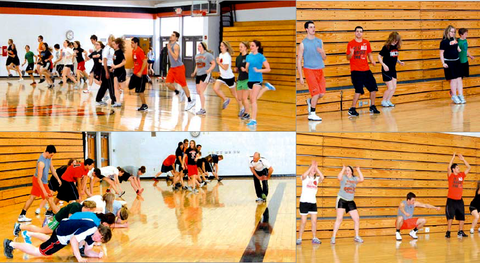A Few Words with Dennis Moon

A coach and PE teacher with over 34 years in the profession shares his insight.
By Kim Goss, MS
Originally Published: May/June 2012
After seven years at Wautoma High School, head football coach Dennis Moon had had enough. He was frustrated with losing, but even more, he was tired of dealing with the apathy of his players. So in 1988, he left the school for four years. The football program soon degraded to the point where the school board decided that they needed to consider dropping it for fear of injury. Moon came back in 1992 to coach football for five more years, but during that time the Hornets had only one winning season. Moon decided to remain at the school but he’d focus on teaching physical education. Then, in 2001 Moon decided to give the team one more chance - this time with BFS.
What Moon did was call Jeff Scurran, a BFS clinician who had developed a reputation for turning around football programs. The first step was a BFS clinic, which Moon made happen in 2001. Although there was a poor turnout, the clinic provided just the spark of hope the school needed – starting with the track team. The football team had an especially impressive turnaround – in 2008 Wautoma won the state championship. By 2011, the school had won 11 conference championships in six different sports, including a state championship in track. What’s more, the BFS program was also adopted into the physical education classes.

Jeff Kasuboski, who was the principal at the time of that first BFS clinic, said this about the influence of BFS: “BFS has made all the difference in the world – it turned everything around. Attitude, character, work ethic... everything has changed.” This June, after Wautoma’s graduation ceremonies, Moon will leave Wautoma to pursue other challenges. This time he is leaving on a high note. This past March I flew to Wautoma, Wisconsin, and had a chance to observe Moon working with the athletes and physical education students. What I witnessed were kids who worked hard, were goal oriented and respectful to their coaches. I wanted to know how Moon had done it, and here is what he said.
BFS: Was it difficult to start the BFS program?
DM: I remember kids mocking BFS when we first implemented it – we even changed the name of the program to “Athletic Development.” Once we trained them and got them bigger, faster, stronger and more athletic, they started to believe they could beat other teams.
BFS: Beyond sets and reps, what did BFS do for your program?
DM: What BFS did, more than anything else, is exactly what Coach Scurran said it would do – it made our average athletes better, good athletes great, and great athletes even greater. This is important because we’ve had some good athletes, but not many of them. In the past four years, we’ve had two all-state quarterbacks, and that is just unheard of for us.
BFS: Have you seen students who were not athletes become so after training?
DM: Yes! We’ve had big, chubby freshmen who could barely squat 90 pounds but who worked hard and eventually became contributing members of our sports teams. Right now I have several freshmen who fall into this category and are just eating up the BFS program – in a year or two, I am certain they will become phenomenal athletes.
BFS: Do you find that kids who come out of the BFS Readiness Program have an easier time adjusting to heavy weight training when they are freshmen?
DM: We had about a dozen middle school athletes come over to train with us on a regular basis, especially in the summer. They do the dot drill and speed and agility work, but they also lift. These athletes are able to jump right into heavy weights, and many have had even better head starts. We’ve had many young boys who could squat 135 pounds, and we even had one-eighth grader do a 225-pound squat.

Speed and agility drills along with flexibility work are part of the training of athletes and physical education students at Wautoma.
BFS: Is it hard to get kids training in the summer?
DM: We get a good group in the summer considering the size of our school. When you add in the middle school kids, we now have as many as 85 kids coming in for training throughout the summer.
BFS: From an administrative perspective, was implementing the BFS program easier than other workout systems you tried?
DM: Oh yes, and there are other benefits. When we have seniors and sophomores in the same class, the seniors will help out the sophomores when they see them performing an exercise incorrectly or they’ll point out the error to me. What I’ve also done with juniors and seniors who cannot get into my upper-limit BFS class is to put them in with my freshmen and have them be student assistants to help with coaching. This creates a higher standard of coaching, especially when I have to deal with classes that have over 30 kids.

Since going with BFS from 2001 to 2011, the Hornets have won 11 conference championships in six different sports, including a state championship in track.
BFS: Is there any problem with having coed classes?
DM: A little when we first started, with the guys trying to show off for the girls; I would have to stand next to them and help them with their focus. The girls were more focused on what they were doing from the start. Now all the kids are extremely focused on their workouts, getting the work in and striving to set personal records.
BFS: What are the major differences in kids now, compared to when you first started coaching?
DM: When it comes down to work ethic, I don’t think that has changed, but there is less respect now than there used to be. Kids will say things to you that, when I was a student, would have got me slapped alongside the head if I’d said them. I’ve also found that kids now want to know why they are doing things, such as a specific exercise; if you explain to them why they become more motivated to train hard.
BFS: What advice would you give a young man or woman who wants to be a physical education teacher?
DM: With today’s job environment, I would tell them to keep their options open – don’t get pigeonholed in one thing. If PE is where you want to go, fine – but what are five other options? Personal training is one option, and in fact, one of my former students has a personal training business with five people working for him. It would also be a good idea for someone going into physical education to get a background in another teaching field as well, such as English or math.
BFS: With you leaving, what will happen to the strength and conditioning program at Wautoma?
DM: I’ve been asking our principal to let me be involved with the selection process of the person taking over the strength and conditioning program. I believe they should have a background in BFS because that’s what we’re doing now and we’ve had tremendous success with it.


 Dennis Moon is now the BFS Clinician for the midwest region and continues to help many high schools to develop winning programs and successful students.
Dennis Moon is now the BFS Clinician for the midwest region and continues to help many high schools to develop winning programs and successful students.
Comments
Joe Haselow said: